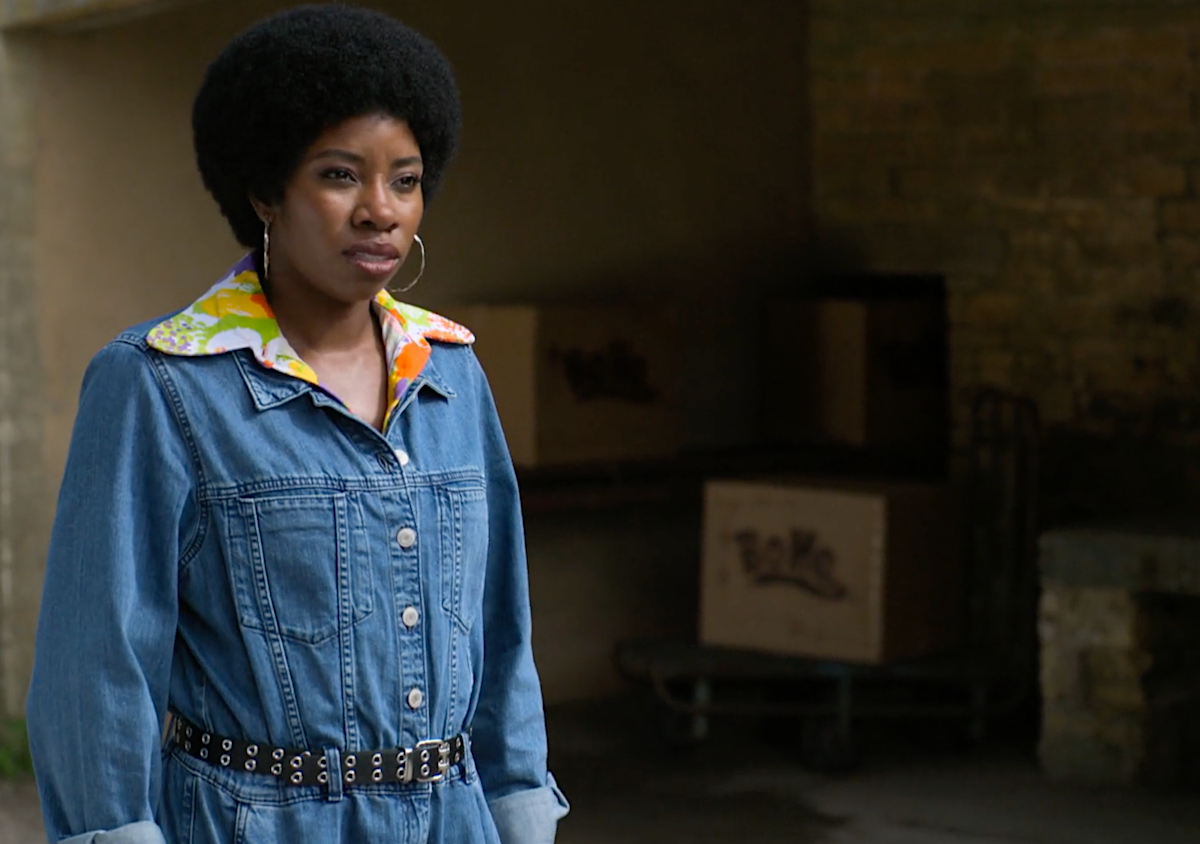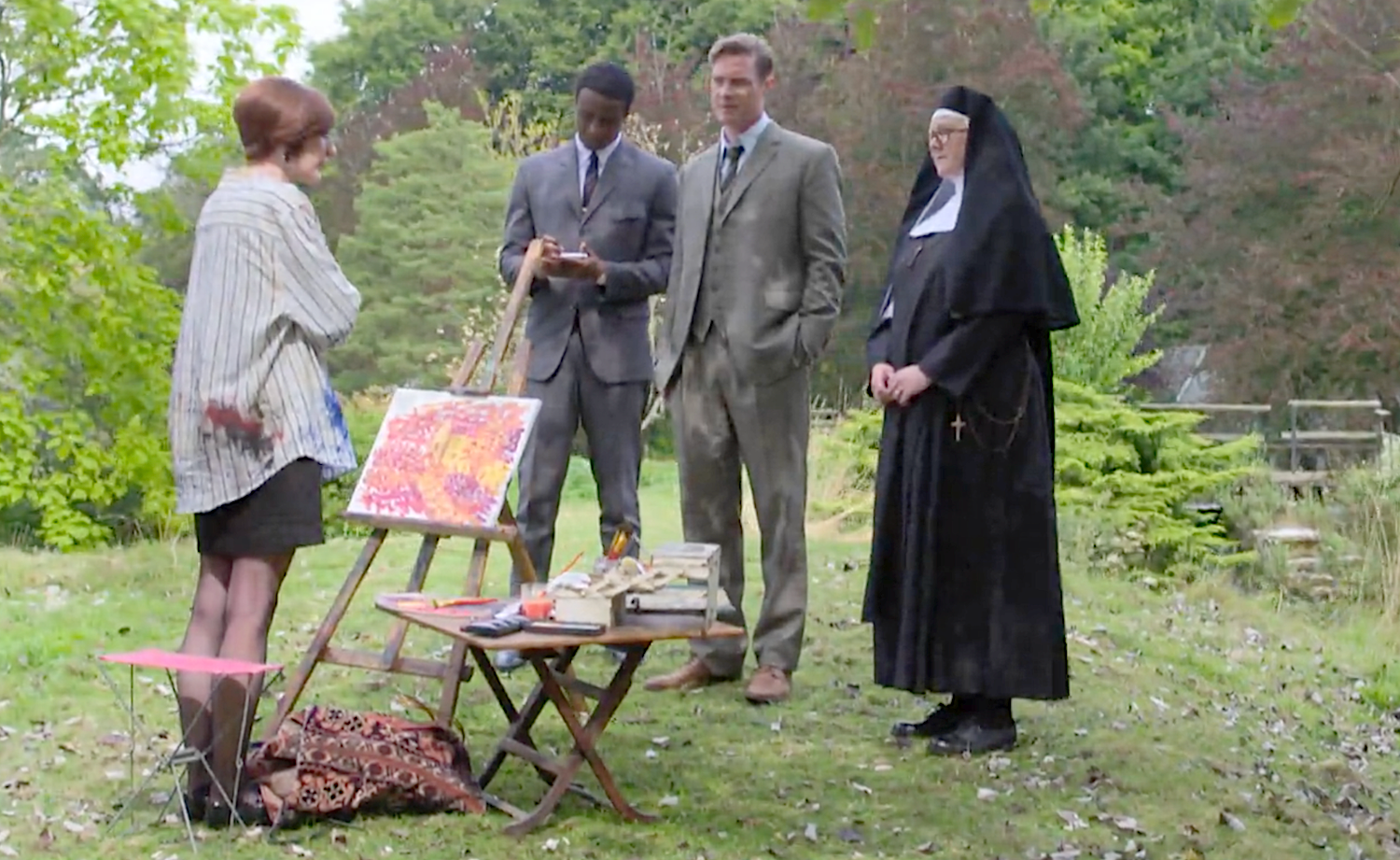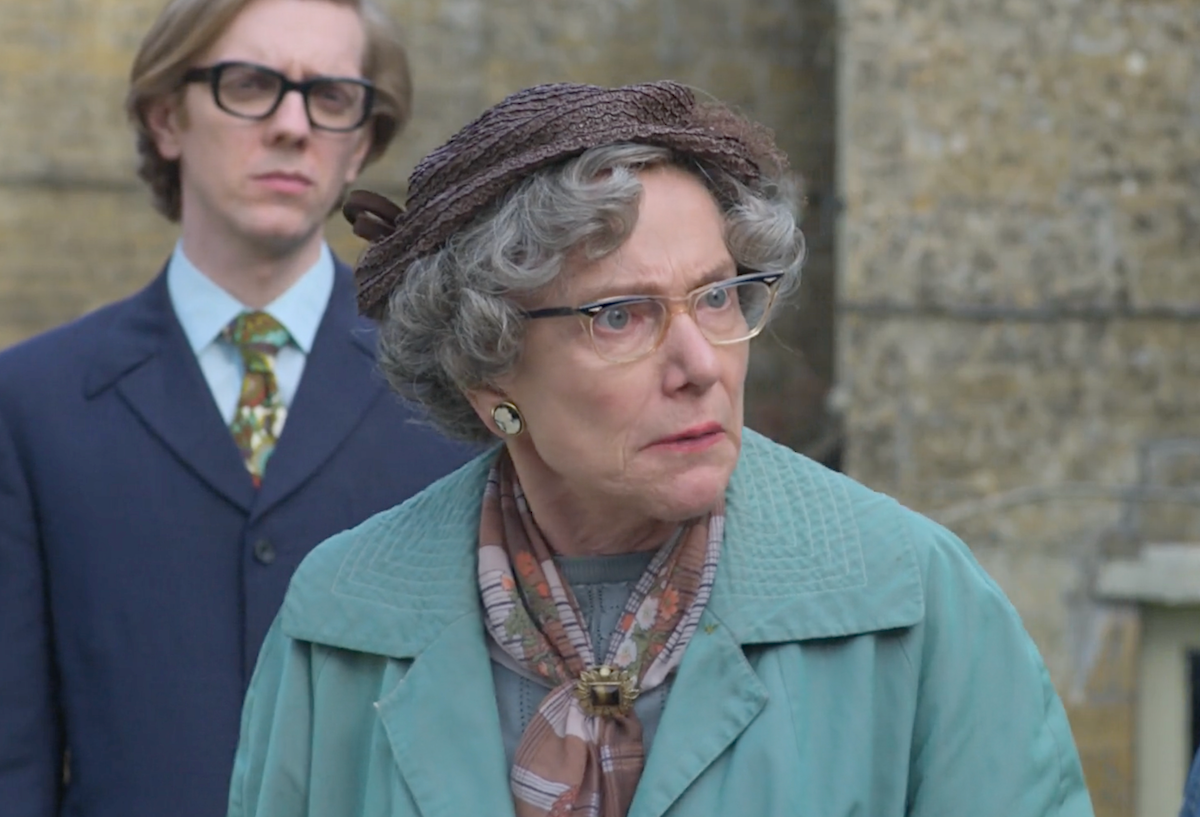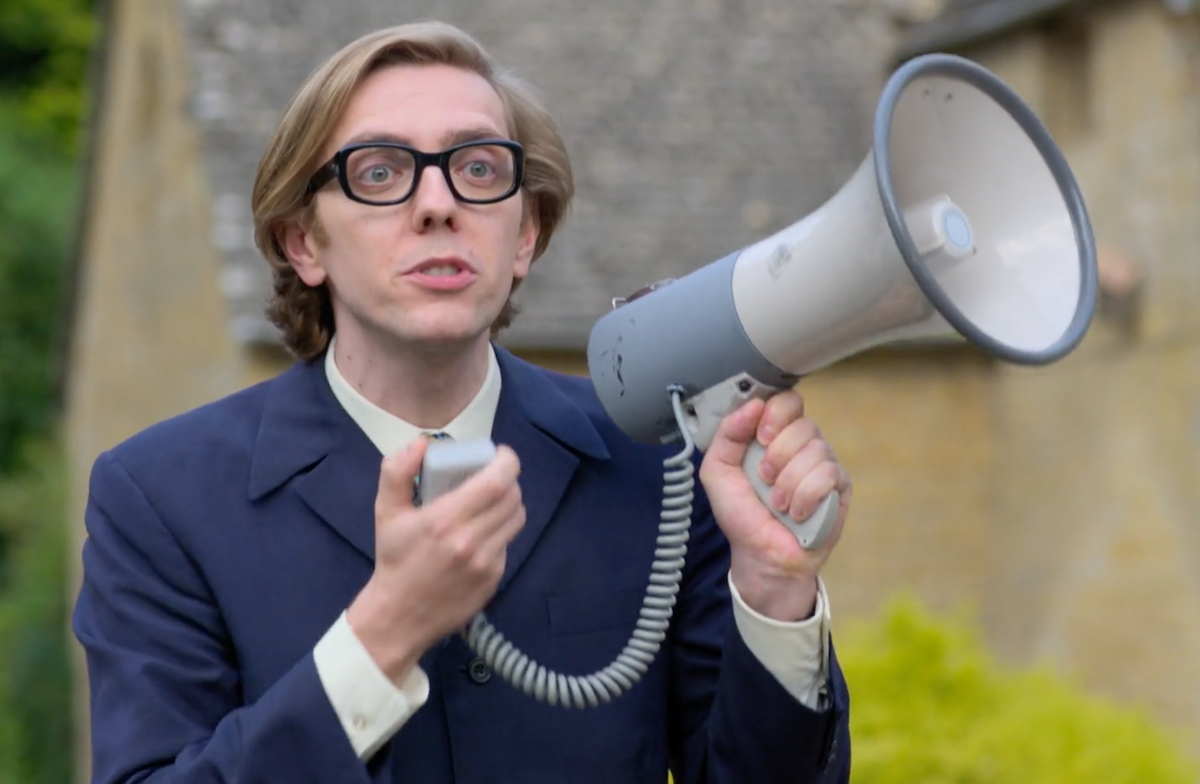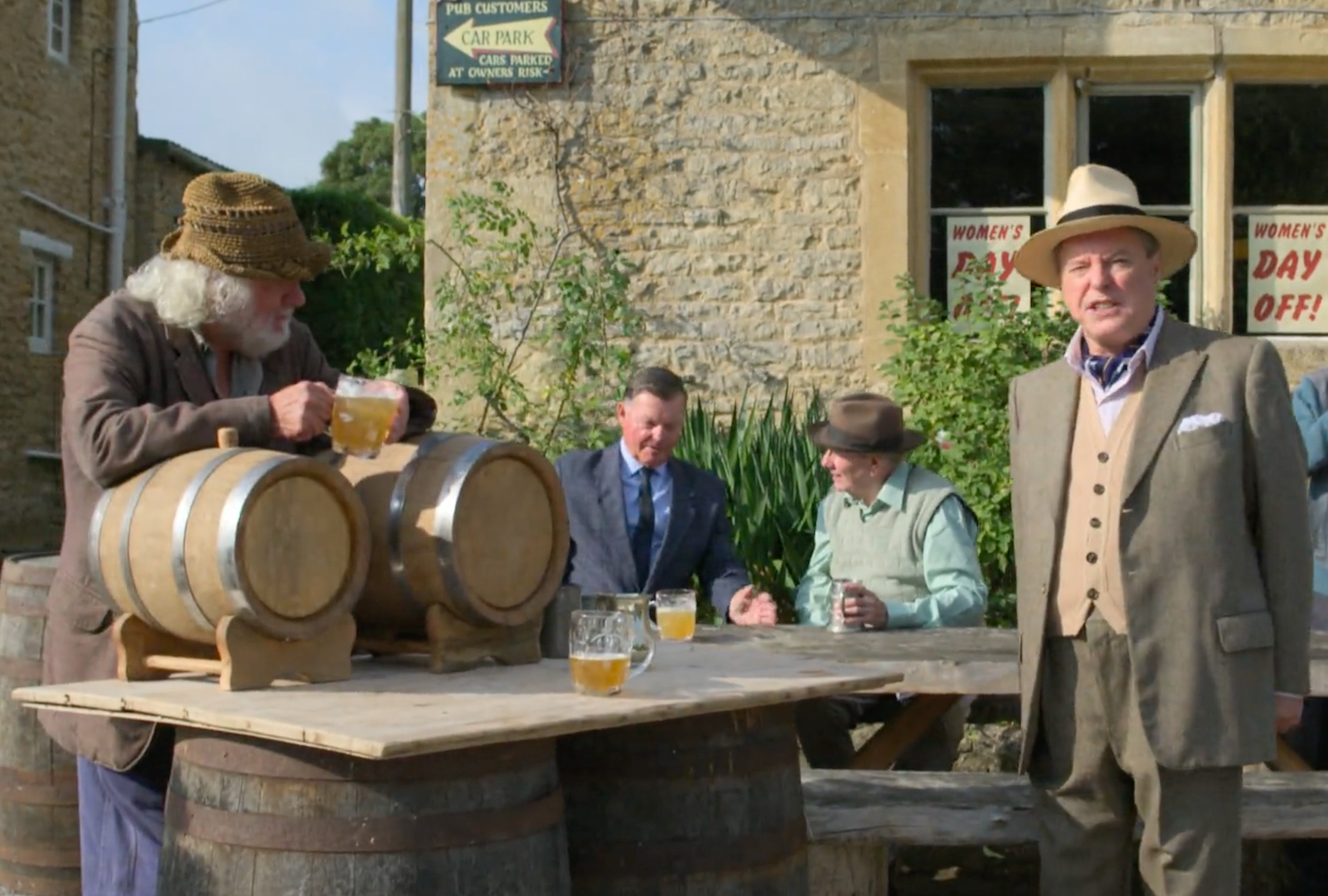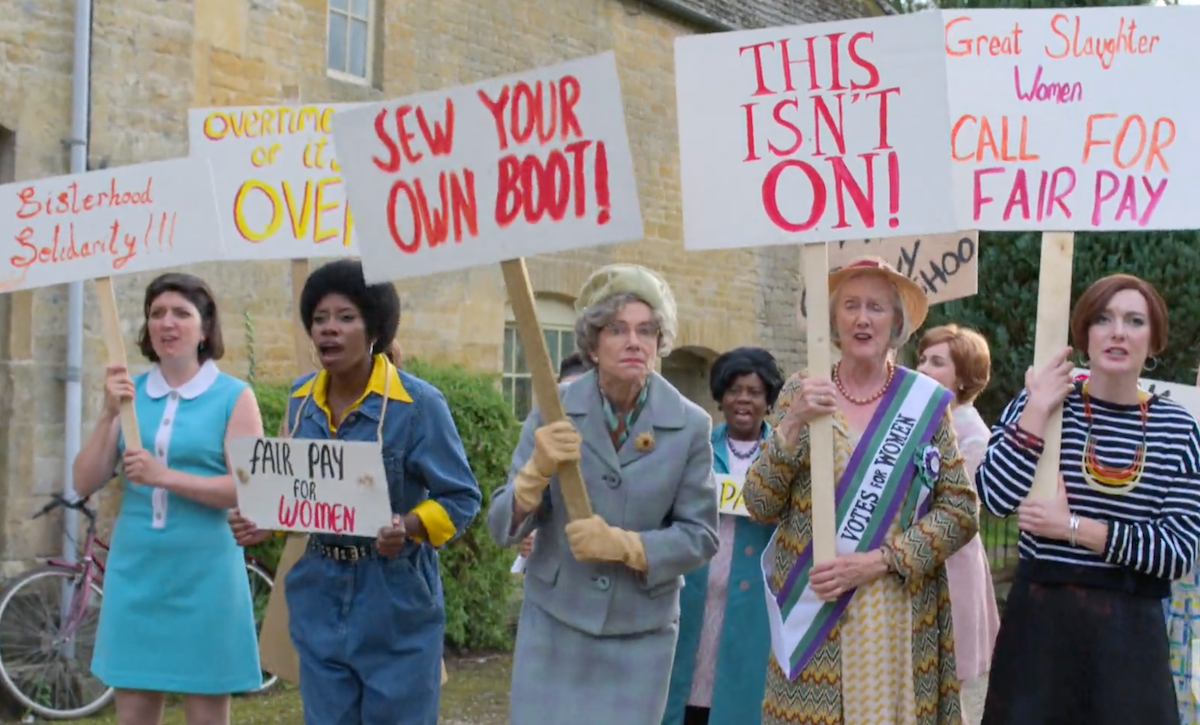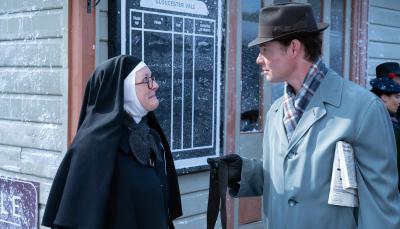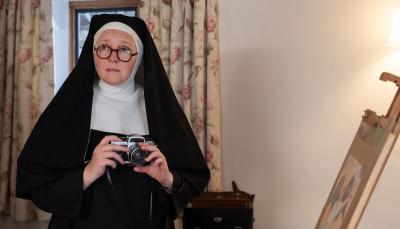'Sister Boniface' Doesn’t Need “Killer Heels” to Bring Killers to Justice
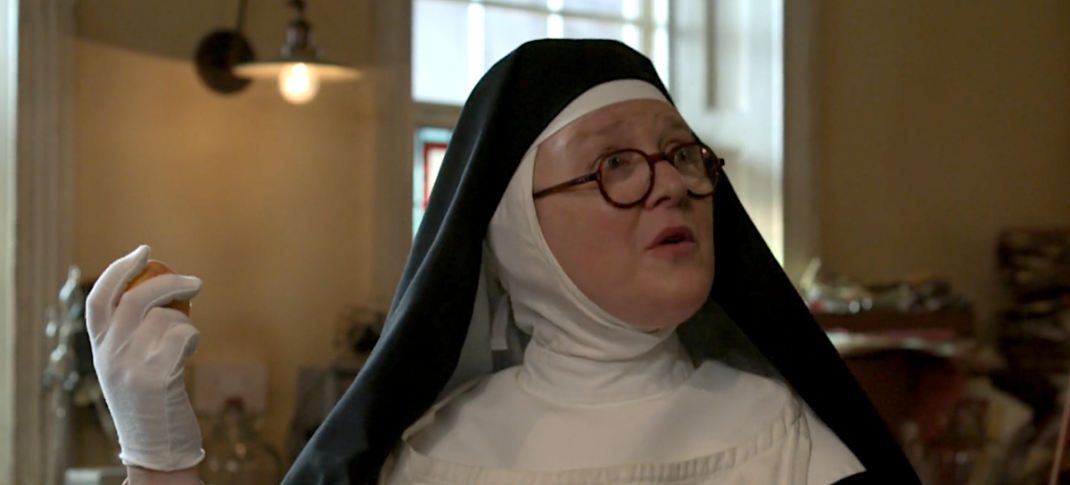
Sister Boniface (Lorna Watson).
© BritBox
Even sleepy rural Great Slaughter experiences the cultural explosion of the 1960s – wild colors, outrageous styles, daring music, feminism, and industrial unrest have arrived for Sister Boniface Mysteries. The opening sequence of Season 4's episode "Killer Heels" features a dolly bird (to use the contemporary vernacular term) who prances around to groovy music in some highly impractical boots and a tiny dress. It’s the promotional effort of the Millington Shoe Factory, which is introducing cutting-edge fashion to customers who, until recently, probably demanded staid, sensible shoes. The 1960s were marked by both silliness and the emergence of serious, far-reaching issues, such as women’s and workers’ rights.
The owner of the factory, Arthur Millington (Peter Wight), aided by his nephew Dermot Millington (Joshua James), plans a grand launch in a few days of his new, incredibly trendy product, the BoHo Boot, aka the coolest kicks in town. Reporter Norman Whalley, once again on the search for the story of a lifetime, visits the factory to interview Arthur, who announces that the grand launch is taking place early next Saturday.
But after Norman exits, Arthur tells his all-woman staff that finances are tight and they’ll have to work extra hours without pay to meet the deadline. They’re not pleased, and Dermot tells his uncle that the women, led by Bernice McDowell (Dani Moseley), are complaining. He’s unfriendly toward the workers, whereas his sister Pamela (Grace Molony) gets on well with them. But when Pamela, an art student, comes to the factory, she sees her uncle has borrowed some of her artwork for his graphics for the new boots, and is infuriated.
Sisters Boniface, Reginald, and Peter are excited about the new boots launch, seeing it as an opportunity to sell their wine at the event. Fashionista Constable Peggy Button longs for a pair of the new boots, but mostly the attitude of townspeople, or at least those gathered in the pub that evening, is dismissive (well, many of them are men). Norman explains to the confused men that the BoHo boot is the same as a GoGo Boot.
Pamela chats to a grumpy Bernice in the pub about how she’s putting together a portfolio for art school. Dermot, who doesn’t know about the women’s pay scale, tells her the men aren’t complaining – they’re just glad of the extra work and the extra cash. Bernice heads for Arthur to confront him with this new information, but he’s talking to Chief Constable Hector Lowsley, who, in his off time, runs the amateur theatrical group in town. He hopes he can count on Arthur for sandals for his next ambitious production, Lysistrata (that’s the one where women go on a sex strike). Sisters Reginald and Peter approach Arthur next, about selling wine at the launch, and he invites them to the factory the next day.
However, when Sister Reginald arrives the next morning, she finds Arthur dead.
Arthur clearly hit his head when he fell, but Sister Boniface doesn’t believe it was the cause. The scent of almonds in the room suggests cyanide was used, but that wasn’t the cause of death either. Despite the warm weather, paper has been burned recently in the fireplace, and someone has handled the files, leaving fingerprints and a single horsehair. Pamela admits she went into her uncle’s office the day before to complain that he had stolen one of her designs for the launch artwork. He offered to buy her off by financing her art school course. The team interviews her outside while she’s painting, and Sister Boniface comments that she seems unwell.
Bernice approaches Dermot and complains about his uncle’s policies – paying them half of what the men earn, and refusing to pay overtime. They work as hard as the men, so why aren’t they paid equally? Dermot, unmoved, reminds her that the men are breadwinners, believes most of the women are there to earn pocket money and avoid housework, and, insultingly, addresses her as “love” and tells her to get back to work. Bernice proposes that they go on strike, and Dermott threatens to fire them all. Cleaner Daisy Dunn (Amy Murphy), already afraid she’ll lose her job, has taken on extra work at the pub.
Sister Boniface performs a chemical analysis on the fingerprints and determines that the substance is Callus Ointment. When she, Sam, and Felix question Bernice, she tells them she used it on her hands and admits she went into Arthur’s office to look at the accounts. The factory wasn’t going bankrupt, far from it. She’d also overheard Arthur shouting at Dermot, telling him he would never inherit the family business.
Bernice is already outside, leading the other women in protest, and Dermot splutters that she’s fired. But he can’t fire her because she’s on strike. Norman, his reporter instincts aroused, turns up to interview Dermot, but Hector and Vera Clam get there first. Hector isn’t there on official business, despite being friends with Arthur, but he’s kindly brought Vera along to talk sense to “these girls.”
Mrs. Clam addresses Norman: “I worked in this factory during the First War, making boots for soldiers. No GoGo boots in those days with the war on,” before turning on Bernice, saying how she ought to be ashamed of "taking advantage of this gentleman’s grief.” Bernice lets her have it. After a short argument over which generation had it harder, Bernice rounds on her, saying that her time in the factory “proved you were every bit as good as the men,” and then starts crowing when Mrs. Clam agrees. Bernice points out that during those wars, she was making a fraction of the men’s wages for exactly the same job, and that it’s the same now.
Mrs. Clam turns the full force of her glare onto Dermot and Hector, who mumble that they’re only women doing a bit of sewing. “Show them your hands,” Mrs. Clam tells Bernice. When Hector comments that it’s only calluses, while the men risked their lives on the front line, Mrs. Clam looks as though she’s going to bite him. “I remember women crawled out from under rubble and got to work so you could have boots to march in.” She grabs a sign and takes over leadership of the demonstration. Go Vera!
Peggy reports back to the nuns, who are excited and pleased, but concerned that they might not be able to sell their wine if the launch falls through. Sister Boniface proposes they offer sisterhood and solidarity of a practical nature, and support the picket line with a rousing chorus of Kumbaya.
Back at the shoe factory, Dermot, truly clueless, offers every woman a free pair of BoHo boots if they go back to work, and he’s booed loudly. Miss Thimble, sporting a suffragette sash, has joined them, and poor Sam and Felix have had to make their own breakfast. Sister Boniface has been up all night working on the burned fragments of paper, and also discovered that the cash box was wiped clean of fingerprints, even though the person who handled it wore rubber gloves – they had left a scrap caught on the metal fittings.
The only person in the factory who wears rubber gloves is Daisy, the cleaner, who was abandoned by her husband and left to raise her children alone. Her landlord threatened her with eviction, and she was desperate. Arthur found her very early that morning with the cashbox and told her he’d speak to her at the end of the day. However, she swears she didn’t kill him, and they believe her.
Dermot has arranged for some women from another factory to be bused over, but Vera Clam and the others persuade them not to cross the picket line. Instead, she encourages the women to stop whatever work they do and let the men of Great Slaughter know their actual value. Sister Boniface tactfully tries to explain the plot of Lysistrata to Sam and Felix without mentioning sex. Peggy, the sole woman in a man’s world at work, looks longingly at the camaraderie of the picket line.
Her work on the burned paper fragments complete, Sister Boniface identifies it as a scientific study of a chemical, acetonitrile, which has gone unnoticed by others. If it’s ingested into the body, it converts to cyanide within about eight hours. The landlady of the pub is on strike, but she lets Sister Boniface, Dermott, Sam, and Felix come in. Tom Thomas, more inarticulate than usual, has set up shop outside, selling and sampling his own home-brew, with Hector one of his few customers. If Arthur was poisoned at the pub, the list of suspects who could have slipped the poison into his brandy glass is long.
In the newspaper archives, Peggy and Norman have made a breakthrough, finding a story about Cora Ashfield, an employee at the factory, who died of an asthma attack, wearing a pendant that looks a lot like the one Pamela has on. The picket line is becoming rowdy and celebratory, as the women have started drinking wine for the launch, and both Pamela and Daisy have joined in. But they become quiet when Sister Boniface and the police arrive, and they escort Pamela inside the factory with Dermot on her heels.
Confronted by Sister Boniface, Pamela admits she and Cora were together. After her death, she discovered the toxic properties of acetonitrile, showed her uncle a paper on it, and argued its use should be discontinued. He scoffed at her and tried to buy her off by paying for art school. Her uncle had no regrets about Cora’s death. She responded by adding the solvent to his brandy glass in the pub, getting some on her own hands, which explained why she felt unwell the next morning.
Joining everyone outside, Pamela begs her brother to make something good out of the tragedy and ban dangerous chemicals. Bernice offers to work with him on making the workers safe as well as the factory productive. Norman gets a photograph of their handshake, and soon after, overtime and a small pay raise have been negotiated. The party for the launch starts, and Bernice and Dermot even get a little flirty. (It must be the wine, whatever’s left of it.)
Hector graciously apologizes to Mrs. Clam and Miss Thimble for underestimating them. Miss Thimble reminds him he never complimented a crumble she’d made earlier that year, and he apologizes for that, too. He’s decided not to produce Lysistrata after all – too salacious, he claims. (And too close to home.)
His consciousness has been raised about as far as it will go, but he has one more surprise announcement. Peggy’s colleagues think highly of her, and they have decided to ...make her salary equivalent to a man’s? (Just kidding!) The gesture of appreciation is a pair of BoHo Boots, and Peggy is thrilled. Not only that, but since one of Dermot’s models hasn’t shown up, she gets to strut her stuff on the runway, wearing her new acquisitions to resounding applause.
Sister Boniface Mysteries Season 4 continues with new episodes every week on Tuesdays on BritBox through the end of September. Seasons 1 through 3 are currently streaming on BritBox. Seasons 1 and 2 are also available on select PBS Passports for members to stream; check your local service.

